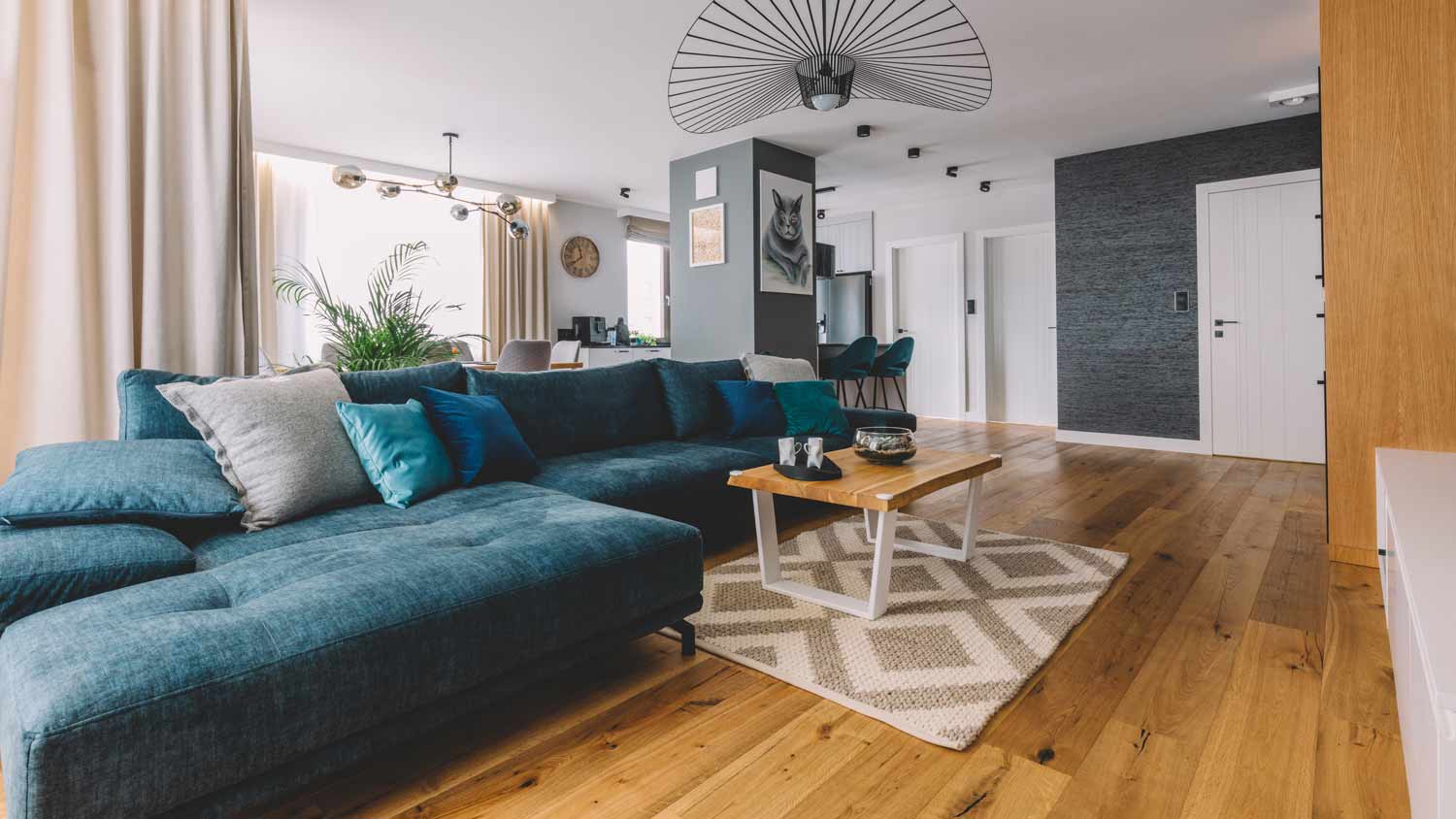7 Budget-Friendly Kitchen Flooring Options for Every Style
Get beautiful kitchen floors that are durable and easy to maintain but also soft on the budget


Dreaming of a new kitchen floor without spending a small fortune? Luckily, there are plenty of inexpensive kitchen flooring options available today, so you can get durable, long-lasting floors at a great price. Below, we’ll cover the best budget-friendly flooring types, including the pros, cons, and estimated costs of each one.
| Budget-Friendly Kitchen Floor | Best For |
|---|---|
| Vinyl | DIYers who want to install their own kitchen floor |
| Laminate | People who want the hardwood look (but not the cost) |
| Linoleum | Eco-conscious folks |
| Rubber | Households with children |
| Concrete | Anyone aiming for a modern aesthetic |
| Cork | People with allergies |
| Terracotta | Southwest or Mediterranean-inspired homes |
1. Vinyl Kitchen Flooring
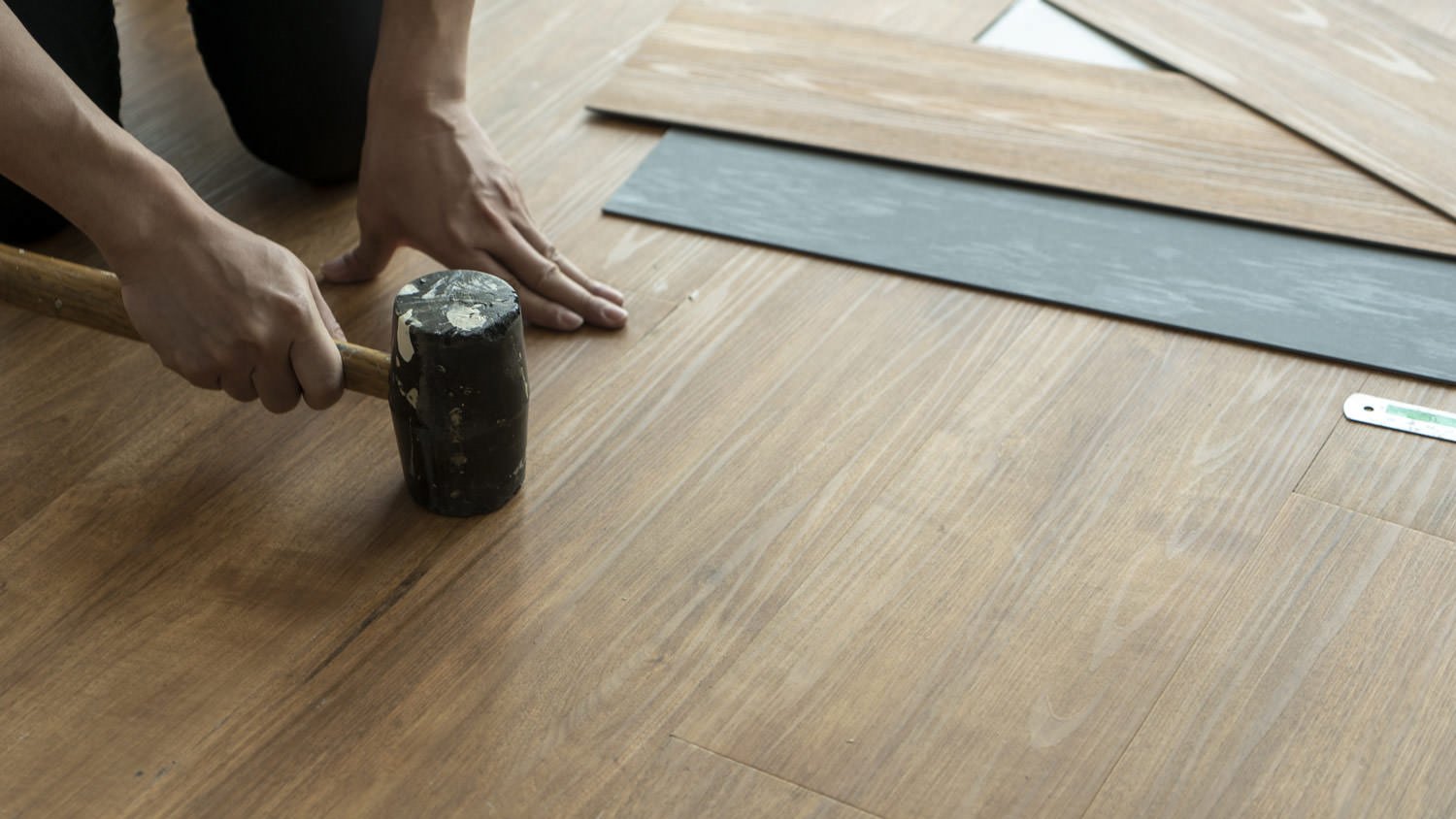
Vinyl flooring offers a beautiful, durable surface at a fraction of the cost of tile, stone, and hardwood floors. Made of synthetic materials, vinyl holds up great in kitchens and other high-traffic areas. You can find attractive colors and patterns that mimic the highest-end tiles and hardwood.
| Pros | Cons |
|---|---|
| Highly durable | Colors may fade in sunlight |
| Water- and stain-resistant | Not made from natural materials |
| Easy to install and maintain | Less eco-friendly |
| Available in many colors and patterns | Difficult to restore when damaged |
Best for: DIYers looking for an easy-to-install flooring material
Cost
Sheet vinyl costs $1 to $2 per square foot on average. Luxury vinyl tiles cost $7 to $10 per square foot on average, making it one of the most affordable tiles for kitchens.
The cost for local vinyl flooring contractors ranges from $3 to $10 per square foot on top of materials, depending on where you live. Contractors handle everything from removing your old floor if needed and sourcing your vinyl, often at a discount.
While vinyl flooring can be installed by experienced DIYers, it’s often best left to an expert, especially for a trickier space like a kitchen.
2. Laminate Kitchen Flooring

Looking for durable flooring that looks like hardwood without the cost? Consider laminate flooring for your kitchen. Laminate is a multi-layer synthetic flooring that mimics wood and offers a durable, easy-to-maintain surface. There are differences between laminate and vinyl flooring, but both are popular affordable kitchen flooring options.
| Pros | Cons |
|---|---|
| Looks like hardwood | Susceptible to moisture damage |
| Comes in many colors and styles | Hard to patch or repair |
| Difficult to scratch, dent, or stain | Best installed by a pro |
| Easy to clean and maintain | Can chip |
Best for: Folks who want the look of hardwood at a lower price
Cost
The average cost for laminate materials is $1 to $5 per square foot, depending on the type. The average cost of installed laminate flooring ranges between $3 and $13 per square foot, including labor and materials.
In a kitchen, hiring a local laminate flooring contractor might be best, as there are challenging corners and fixtures to work around. The final result will look more professional if you hire a pro, especially if you don’t have experience laying flooring. Professionals are also trained not to waste material when cutting pieces.
The price for laminate flooring fluctuates seasonally, and winter is often the best time to buy, but talk with your contractor about discounts they may be eligible for.
3. Linoleum Kitchen Flooring

Made of all-natural materials like jute, cork, rosins, and linseed oil, linoleum flooring comes in sheets or tiles that snap together. While linoleum has been around for over 150 years, the material has vastly improved.
Learn all about the pluses and minuses and how linoleum differs from laminate and vinyl before moving forward.
| Pros | Cons |
|---|---|
| Withstands everyday wear and tear | Less durable |
| Scratch-resistant | Must be resealed every few years |
| Fully recyclable | May fade in sunlight |
| Available in various colors and patterns | Installation can be challenging |
Best for: People looking for an affordable eco-friendly flooring material
Cost
The price of linoleum flooring depends on the type of linoleum you choose. For example, linoleum sheet costs $2 to $5 per square foot on average, while linoleum tile costs $4 to $7 per square foot. Installation adds $1 to $5 per square foot, making the total cost for linoleum between $3 and $12 per square foot.
Linoleum installation is best left to the pros, as cutting and laying the material can be tricky. You can save on costs helping your linoleum contractor with pieces of the project like preparation and caulking.
4. Rubber Flooring

Affordable residential rubber flooring is made of either natural tree rubber or synthetic materials, such as recycled vehicle tires. Rubber floors offer extra padding and are water-resistant.
Learn about the pros and cons and rubber’s appearance to determine if it’s right for your kitchen.
| Pros | Cons |
|---|---|
| Absorbs large impacts and won’t shatter | Installation isn’t always DIY-friendly |
| Comfortable on your feet, back, and knees | Gives off a distinct odor at first |
| Water-resistant | Aesthetic isn’t for everyone |
| Durable | Not as many style options |
Best for: Families with young children
Cost
On average, rubber flooring material costs between $3 and $8 per square foot, with rolled mats being the least expensive option at $1 to $5 per square foot. For rubber flooring, expect to pay between $1 and $4 per square foot for installation on top of materials. Because rolled mats are easier to install, labor costs are lower than rubber floor tiles.
5. Concrete Flooring
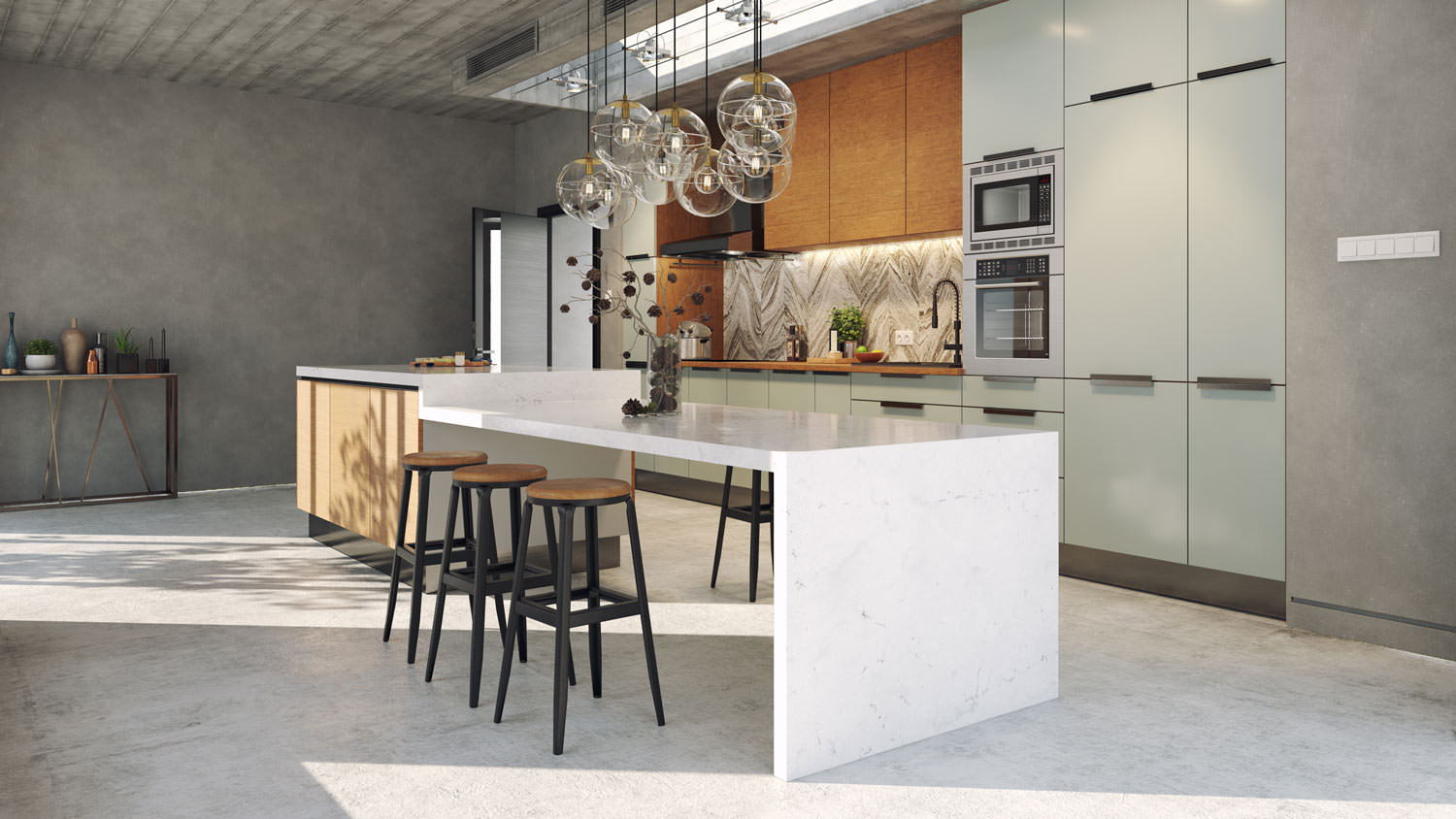
Concrete can offer a smooth, modern feel to your kitchen, and offers incredible longevity. Concrete flooring is made up of water, cement, and aggregates. It can be stained, polished, or etched for an interior floor.
Decide if budget-friendly concrete kitchen flooring is right for you by learning about the pluses and minuses.
| Pros | Cons |
|---|---|
| Easy to maintain | Less comfortable to walk or stand on |
| Long life span | May crack over time |
| Allergy-friendly | Can feel cold underfoot |
| Holds up well to everyday foot traffic | Discoloration or imprinting can occur with DIY installation |
Best for: Anyone who wants to bring an industrialist vibe to their kitchen
Cost
Polished concrete floors cost anywhere from $2 to $16 per square foot, including installation. One layer of stain with a basic design will be on the lower end, while elaborate designs and advanced coloring top the range.
6. Cork Flooring

Cork flooring is made of cork oak tree bark that is dried, ground, and compressed with resin. Cork kitchen flooring comes in tiles or planks. You can stain, paint, bleach, or refinish cork to make it look like any other flooring, including hardwood.
Check out the pluses and minuses of affordable cork flooring to see if it's right for your kitchen.
| Pros | Cons |
|---|---|
| Feels comfortable on the feet | Must be resealed occasionally |
| Sound-dampening | Fading can occur in direct sunlight |
| Prevents heat loss and may reduce energy costs | Heavy or sharp objects can cause damage |
| Antimicrobial and hypoallergenic | Tend to have shorter warranties |
Best for: Individuals with allergies
Cost
The cost of cork flooring material ranges from $3 to $10.50 per square foot. Installation costs $2 to $9 per square foot, making installed cork flooring a total of $5 to $19 per square foot.
Ask a local flooring company for a quote to determine if you should DIY or hire out the project.
7. Terracotta Tile Flooring
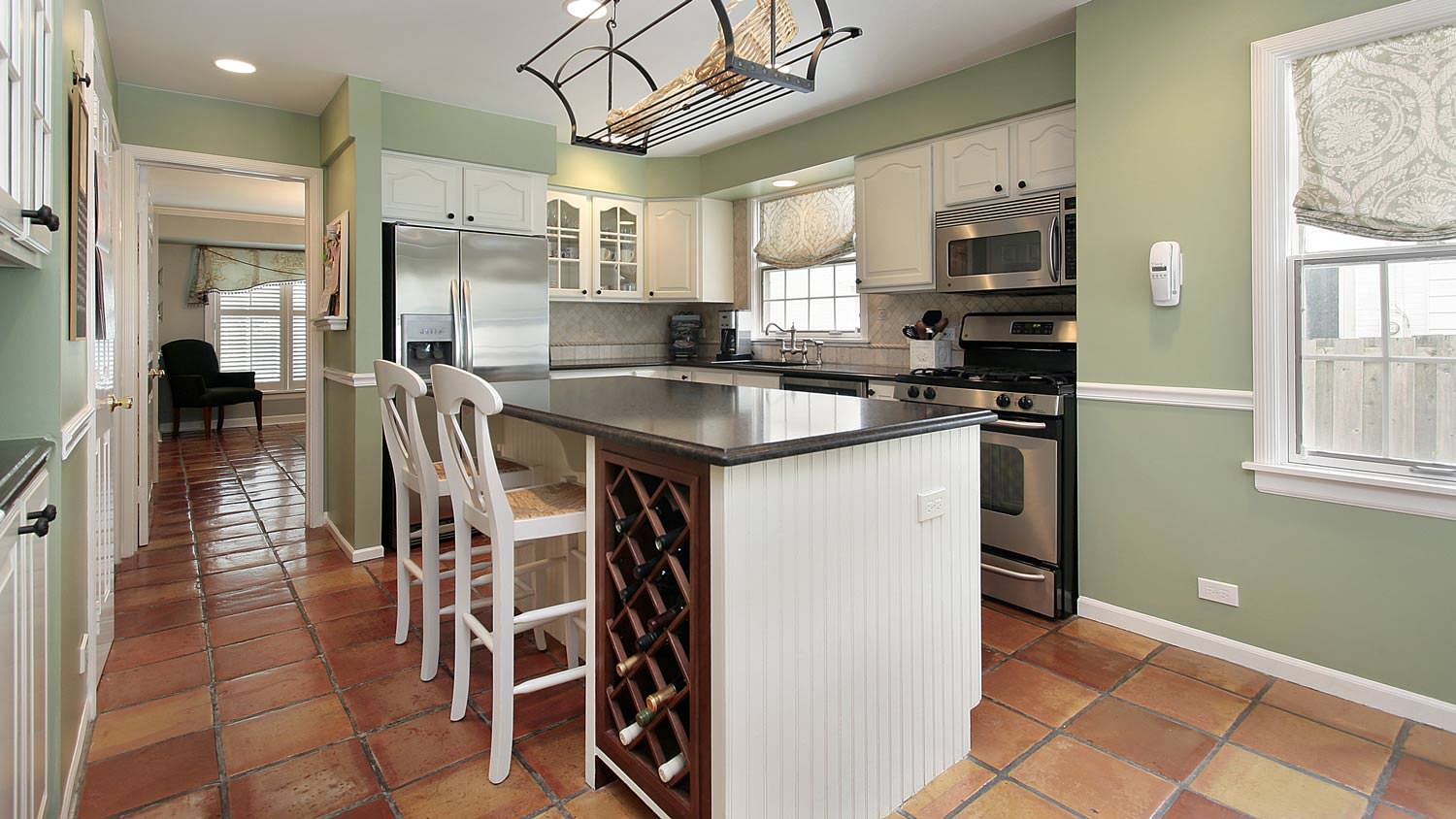
With earthy tones and an array of patterns, terracotta tiles can offer a warm vibe to your kitchen. Made of reddish clay, terracotta is a ceramic material but is more inexpensive than other ceramic tiles.
Learn about the benefits and drawbacks of this classic budget-friendly flooring style.
| Pros | Cons |
|---|---|
| Unique, beautiful look | Annual sealing required |
| Less expensive than other ceramic tiles | Lower-density types are susceptible to water damage |
| Mold- and bacteria-resistant | Can stain |
| Durable (when sealed and maintained properly) | Harder to install than laminate or vinyl |
Best for: Homes with a rustic, Southwestern, or Mediterranean aesthetic
Cost
You can find terracotta tile for as little as $1 to $3 per square foot. Higher density terracotta tiles are more expensive, but are also more durable. Unless you are experienced, a pro is recommended for installation. Labor costs raise the price of a terracotta tile floor to between $5 and $13 per square foot, but could be more depending on your geographical region.
Jenna Jonaitis contributed to this piece.
Frequently Asked Questions
Porcelain and ceramic tile are two of the longest-lasting kitchen flooring materials. However, while these materials can withstand a good amount of daily wear and tear, they’re likely to crack if you drop something heavy on them, and they’re pricier than many other options. On average, installing a ceramic tile kitchen floor costs between $1,240 and $11,250. Other durable kitchen flooring options include natural stone and concrete.
You can buy inexpensive kitchen flooring off the shelf at most home improvement stores with the best prices offered by big-box chain stores. Be aware, though, that not all flooring materials are suitable for DIY installation. Most flooring contractors can buy your flooring at a discount, so be sure to check with your contractor before buying your flooring materials.
The most affordable kitchen flooring option is sheet vinyl due to its low material and installation costs, followed by laminate flooring and vinyl planks. Be sure to get quotes from flooring companies in your area for exact estimates for your kitchen floor. If you let them know that you’re looking for kitchen floor ideas on a budget, they can suggest products and materials within your price range.

.jpg?impolicy=leadImage)

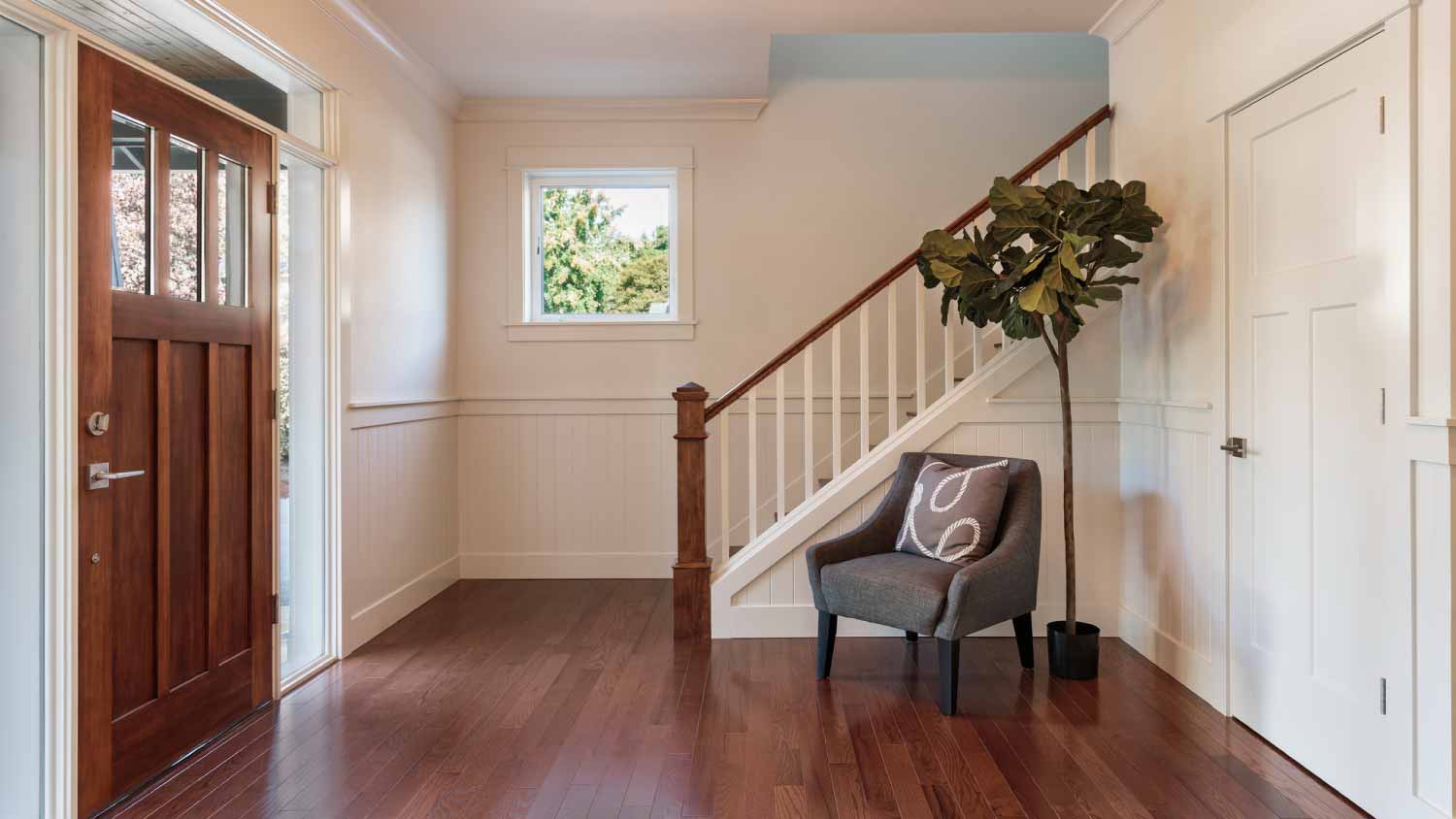

- 6 Inexpensive Flooring Options That Look Good and Save You Money
- 11 Types of Flooring to Consider for Your Home
- 15 Great Options for Budget-Friendly Kitchen Floors
- 6 Options For Improving Your Attic Flooring
- What’s the Best Flooring for Kitchens? Explore 10 Top Picks
- The Best Types of Flooring for Your Home Gym
- What Types of Flooring Can Be Installed Over Ceramic Tile?
- Estimate Your Flooring Cost With These Factors
- How Long Does Laminate Flooring Last? What to Know Before Installing or Replacing Your Flooring
- Cleaning Methods for Every Floor Type



